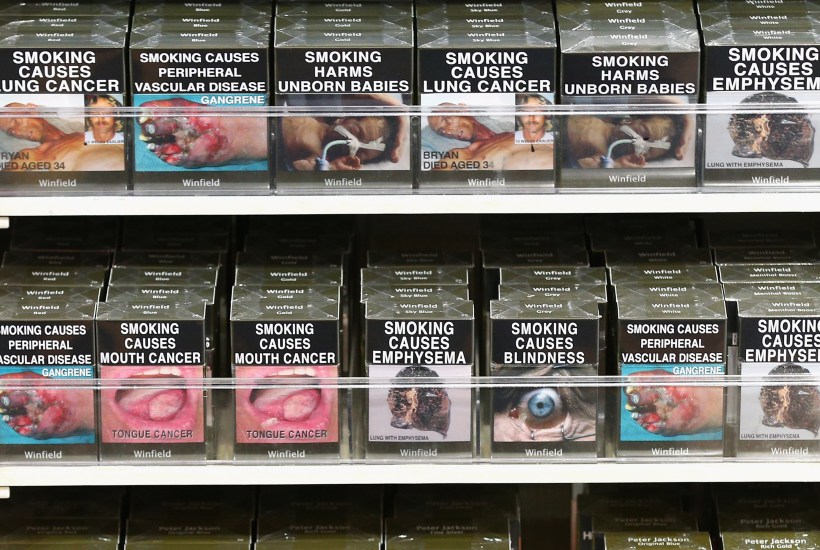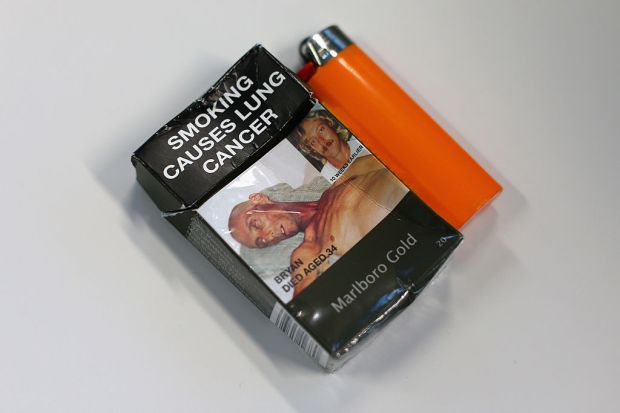Five years have passed since a coalition of tobacco-producing nations including Indonesia and Honduras challenged Australia’s world-first laws that prevent cigarette companies from using their own brands or logos through mandated plain packaging and the World Trade Organisation has finally issued its verdict declaring them valid under its rules.
Over the five years that the WTO sat on the dispute, Australia’s smoking prevalence rates have stalled despite falling sharply in the years prior to plain packaging and despite continued hikes to tobacco excise which have made us home to some of the world’s most expensive cigarette packs.
The ease of counterfeiting plain packs and the difficulties faced by consumers in differentiating these packs from their generic legal alternatives has also driven dramatic growth in our tobacco black market – an estimated $15 billion a year industry that funds other illicit enterprises while costing the federal government billions in foregone revenue.
The impacts have been so severe that Canberra recently earmarked over a billion dollars in taxpayer funds for an ‘illicit tobacco taskforce’ to reclaim some of the lucrative proceeds. The Australian Criminal Intelligence Commission found that compound levels in population-wide samples of wastewater across all major capital cities and tested regions in 2016-17, showed a strong rise in nicotine consumption- meaning that the actual size of the problem may be even larger than expected.
Even putting this poor outcome and the glaring failure to reduce smoking aside, the government has also failed to make the case that the laws have made smoking less attractive. Their own independent reviewer of the evidence conceded that the effects of plain packaging on visual appeal could not be isolated from graphic health warnings, those lovely pictures of diseased and cancer-riddled human bodies and organs, which have donned Australian cigarette packets since 2006- well before plain packaging.
Yet the WTO has chosen to ignore these facts in yesterday’s verdict which is sure to put the wind in the sails of taxpayer-funded public health bureaucrats and nanny state activists who have already called for the extension of plain packaging to fast food, alcohol and other vices they think our hapless population needs saving from.
One can only wish that these individuals were invited to more parties in high school or university before they grew up and turned into a fun politburo determined to turn supermarket shelves stacked with the things we enjoy into rows of generic cartons in scenes reminiscent of 1984. They’ve already had limited success elsewhere in the world, with Chile banning the use of cartoon characters in cereal advertisements since 2016. Brand Finance estimates the cost of such laws to be $250 billion USD to the international beverage industry alone if introduced. And that’s a conservative estimate.
While many of us would struggle to sympathise with tobacco companies deprived of their branding, the arbitrary appropriation of intellectual property rights across entire industries by our governments as part of a failed policy is a terrible precedent that prioritises political virtue signalling over public health and has been proven to line the pockets of criminals.
Since the UK introduced its own plain packaging laws last year, Retail Express has already identified that country’s first counterfeit plain packs with Her Majesty’s Revenue and Customs office reporting a whopping 33% increase in illicit trade across the UK over the past year.
While British cigarette smoking, in general, has risen by 0.7 per cent over the same time in the UK, the policy did achieve a significant cut in one area –- all cigarette packaging factories have closed since the laws were introduced. While politicians and bureaucrat elites in London may rejoice at the thought of factories in Portsmouth, Bristol and Bradford that package the product they hate so much closing down, the impact has been devastating for workers and apprentices once employed at these factories, many of whom have been denied a career path into the wider packaging industry at a time when manufacturing jobs in the Western world are already under serious threat.
The UK and Australia aren’t even the only places where plain packaging has been a public health disaster. The French Health Minister, Agnes Buzyn, recently admitted that smoking had increased in France since their own plain packaging laws were introduced early in 2017 while France remains home to Europe’s largest tobacco black market.
It is unfortunate that the WTO, a body funded by the taxpayers of UN member states including Australia to promote trade and investment, has given a green tick to laws which have failed in multiple countries while allowing governments to trod over the rights of businesses to use their basic intellectual property. Plain packaging not only deprives companies of their most valuable assets – brands, trademarks and logos — but also patronises consumers by denying us the ability to make informed choices.
The extension of these laws to other industries buoyed by yesterday’s decision would damage market conditions, creating barriers to free trade while deterring investment and innovation. Australian craft brewers have already spoken out about how branding bans would kill off large sections of their industry, putting thousands of regional Australian jobs at stake.
It is likely that the complainant nations will appeal the WTO’s decision. If the WTO is serious about doing what we fund it to do, it must consider the extensive evidence and send a strong message against failed nanny state plain packaging laws.
Satyajeet Marar is the Director of Policy at the Australian Taxpayers’ Alliance.
Got something to add? Join the discussion and comment below.
Got something to add? Join the discussion and comment below.
Get 10 issues for just $10
Subscribe to The Spectator Australia today for the next 10 magazine issues, plus full online access, for just $10.


























Comments
Don't miss out
Join the conversation with other Spectator Australia readers. Subscribe to leave a comment.
SUBSCRIBEAlready a subscriber? Log in